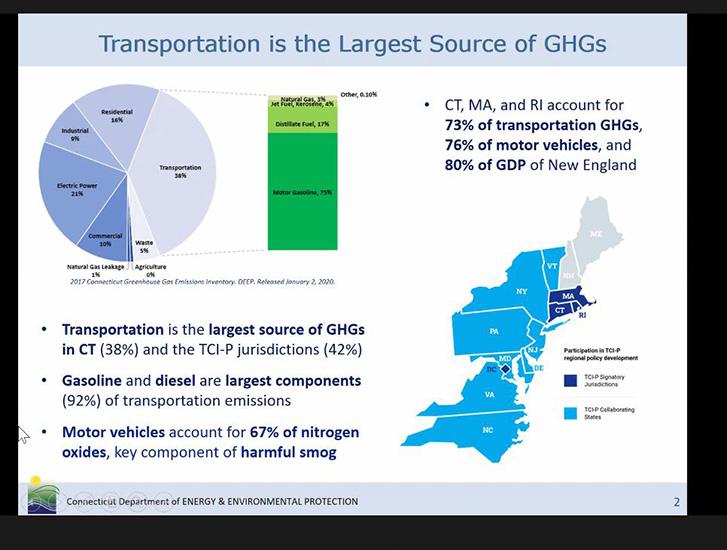Massachusetts is taking decisive steps to transform its transportation infrastructure in response to the escalating threats posed by climate change. With transportation accounting for 37% of the state’s greenhouse gas emissions-the largest share of any economic sector-state officials are prioritizing investments that enhance system resilience, promote clean energy, and advance enduring transit solutions.This initiative aims not only to protect vulnerable communities from climate-related disruptions but also to align with Massachusetts’s ambitious climate goals, ensuring that future transportation projects reduce environmental impact while bolstering regional preparedness [[1]](https://www.environmentalleague.org/modernizing-transportation/) [[3]](https://thebostonweekly.com/massachusetts-gears-up-transportation-for-climate-change-impact/).
Table of Contents
- Massachusetts Invests in Resilient Infrastructure to Combat Rising Sea Levels
- Expanding Public Transit Networks to Reduce Carbon Emissions and Traffic Strain
- Enhancing Roadways and Bridges for Extreme Weather Durability
- Promoting Sustainable Transportation Policies to Support Long-Term Climate Goals
- Concluding Remarks
Massachusetts Invests in Resilient Infrastructure to Combat Rising Sea Levels
Massachusetts is accelerating efforts to fortify its transportation infrastructure in response to the imminent threats posed by rising sea levels. Strategic investments focus on enhancing the resilience of roads, bridges, transit systems, and coastal flood defenses.By integrating cutting-edge engineering with climate projections, the state aims to minimize disruptions to daily commutes and commercial activities. These initiatives emphasize adaptive design solutions such as elevated roadways and improved stormwater management to withstand increasingly severe weather events.
Key measures being implemented include:
- Retrofitting vulnerable bridges and tunnels to resist flooding and saltwater intrusion
- Expanding green infrastructure to absorb storm surges and reduce runoff
- Deploying real-time monitoring systems for early flood warnings and infrastructure health tracking
- Collaborating with local municipalities to ensure seamless emergency response and recovery planning
These proactive measures position Massachusetts as a leader in climate adaptation, safeguarding critical transit corridors while supporting long-term economic vitality and public safety.
Expanding Public Transit Networks to Reduce Carbon Emissions and Traffic Strain
Massachusetts is accelerating efforts to expand its public transit infrastructure as a critical step toward mitigating carbon emissions and alleviating chronic traffic congestion. By investing in enhanced bus and rail networks, the state aims to shift a significant portion of daily commuters away from single-occupancy vehicles to more sustainable, shared modes of transportation. This strategic pivot not only lowers greenhouse gas emissions, which transportation currently dominates, but it also enhances connectivity to essential services like employment centers, healthcare, and education, fostering greater equity across urban and suburban communities.
Key expansion initiatives highlight:
- Increased frequency and capacity on existing transit routes to accommodate growing demand
- Integration of new technologies for cleaner, more efficient public vehicles
- Improved accessibility through expanded service coverage, especially in underserved areas
Experts emphasize that transitioning even a fraction of trips from private cars to public transit can reduce emissions by up to two-thirds per passenger kilometer, making this an essential component of Massachusetts’ climate resilience strategy. These enhancements also promise to ease urban traffic strain, promoting a smoother, more sustainable commute for all residents.
[Source]
Enhancing Roadways and Bridges for Extreme Weather Durability
Massachusetts is spearheading a comprehensive initiative to fortify its infrastructure against the increasing intensity and frequency of extreme weather events. State engineers are integrating advanced materials and innovative design standards to improve the resilience of roads and bridges. These include the use of high-performance concrete reinforced with corrosion-resistant steel, engineered to withstand flooding, heat stress, and freeze-thaw cycles more effectively. Additionally, elevated roadbeds and improved drainage systems are being installed to mitigate the risk of washouts and prolonged flooding, ensuring safer, more reliable travel during severe storms.
Key components of this adaptation strategy feature:
- Smart sensors and monitoring technology embedded in bridges to provide real-time data on structural health during and after extreme weather events.
- Flexible expansion joints and shock-absorbing materials designed to accommodate shifts caused by temperature fluctuations and seismic activity.
- Green infrastructure solutions such as permeable pavements and vegetated swales to reduce runoff and improve water management.
These combined efforts underscore Massachusetts’s commitment to safeguarding critical transportation networks, supporting economic stability, and protecting public safety now and into the future.
Promoting Sustainable Transportation Policies to Support Long-Term Climate Goals
Massachusetts is advancing bold transportation policy reforms designed to curb greenhouse gas emissions while fostering resilient infrastructure. The state’s strategic plans emphasize expanded public transit options, incentivizing zero-emission vehicles, and integrating smart technology to optimize traffic flow. These efforts align with global objectives to achieve sustainable development, ensuring robust urban mobility without compromising natural resources for future generations. Key policy measures include:
- Investment in electrified public transportation fleets to reduce reliance on fossil fuels
- Infrastructure upgrades for cycling and pedestrian pathways, promoting active, low-carbon travel modes
- Implementation of congestion pricing to discourage high-emission vehicle use during peak hours
- Support for regional collaboration to create integrated transportation networks that reduce overall emissions footprint
These initiatives demonstrate Massachusetts’ commitment to a sustainable transportation future by embedding climate resilience into its planning frameworks. By prioritizing multimodal systems that limit environmental impact and support equitable access, the state positions itself at the forefront of meeting the United Nations’ Sustainable Development Goals related to climate action and sustainable cities. The holistic approach emphasizes long-term environmental benefits intertwined with economic vitality and social well-being, setting a precedent for communities worldwide striving for sustainability.
Concluding Remarks
As Massachusetts advances its efforts to shield transportation infrastructure from the escalating impacts of climate change,the state sets a benchmark for resilience and innovation. With a strategic focus on sustainability and adaptation, these measures underscore Massachusetts’ commitment to safeguarding the mobility and safety of its residents amid an uncertain climate future. Continued collaboration between government agencies, local communities, and experts will be essential as Massachusetts navigates the evolving challenges posed by a changing environment.

